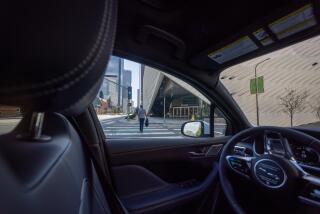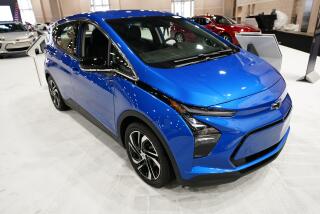Automaker Data Say SUVs Are Riskier
- Share via
WASHINGTON — A key automaker group Tuesday released figures showing that people in sport utility vehicles are more likely to die in crashes than are occupants of passenger cars.
Officials of the Alliance of Automobile Manufacturers defended the safety of SUVs and said the difference in death risks was “statistically indiscernible,” but independent observers said the numbers indicate that automakers may be slowly acknowledging the problems of their most profitable products.
The figures were released in advance of a scheduled Senate hearing today on SUV safety. Automakers are trying to head off more government mandates by pledging to address safety issues in collaboration with federal regulators and outside experts.
Until now, auto companies have carefully cited statistics to suggest that SUVs are safer than cars. But in a briefing for reporters, the alliance released numbers showing that the death rate in accidents was 3.5% higher for people in SUVs than for those in passenger cars. The numbers were for 2001, the most recent year available.
Robert Strassburger, vice president for safety with the alliance, said the safety performance of SUVs is improving every year, an indication of better design. And despite the death-rate figures, he asserted that “at a minimum, SUVs are as safe as automobiles.”
“They are certainly as safe, if not safer, than passenger cars,” he said.
The group’s analysis found that people in SUVs were much less likely to die in front-end, side and rear-end collisions than passenger car occupants, but nearly three times more likely to be killed in rollovers.
“Rollovers remain a significant safety issue,” said Strassburger.
However, he pointed out that 72% of people killed in SUV rollovers were not wearing their seat belts.
Safety “is a shared responsibility,” Strassburger said. “What we are able to do is limited by what our customers do with a vehicle once they get into it.” One thousand lives a year would be saved if all SUV drivers buckled up, he added.
Although the Alliance used its presentation Tuesday to emphasize the improved design of SUVs, auto safety experts focused on the bottom-line admission that SUVs cause as much or more highway carnage than other vehicles.
Joan Claybrook, president of the advocacy group Public Citizen and a former head of the National Highway Traffic Safety Administration, said the release of the statistics marked “the first time that the manufacturers, in writing, have acknowledged that SUVs overall are not as safe as cars.”
Brian O’Neill, president of the Insurance Institute for Highway Safety, had a similar reaction.
“I think they can’t bury their heads in the sand as they have done,” he said. “They are recognizing that there are safety issues that are unique to SUVs.”
Thomas Wenzel, a researcher at Lawrence Berkeley National Laboratory who has studied risks of different vehicle types, said the statements by the manufacturers’ group underscore how defensive the industry is becoming.
Previously, Wenzel said, vehicle makers always implied that SUVs are safer than cars.
“Just the fact that they’re saying SUVs are as safe as cars ... is an admission I’ve never heard from them before,” Wenzel said.
A study co-authored by Wenzel and Marc Ross of the University of Michigan found that death rates for drivers of SUVs are higher than for drivers of large and mid-size cars. The best compact cars had lower driver fatality rates than the average SUV, according to their research.
SUVs have a tendency to roll over in sudden maneuvers, and they can inflict damage on smaller vehicles in front-to-side collisions that is not survivable. Pickup trucks share the same safety problems as SUVs.
Although rollovers account for only 3% of crashes, they killed more than 10,000 people in 2001, accounting for a third of fatalities among vehicle occupants. Of the rollover deaths, 2,142 occurred in SUVs, the industry analysis showed.
Though SUV safety is a long-standing concern in auto circles, it was given new prominence last month when the top federal auto regulator said some models are so unstable that he would not let his kids drive them.
Jeffrey Runge, head of NHTSA, challenged the industry to tackle the problems of SUV rollovers and disproportionate crash damage to smaller vehicles. He held out the threat of new federal safety standards, if the automakers refused to act.
Some automakers reacted angrily. Calling Runge’s comments “unfair,” General Motors Corp. said “SUVs are among the safest vehicles on the road and have contributed dramatically to the decline in the nation’s fatality rate over the last decade.”
In the last two weeks, automakers quietly signaled that they are willing to work with Runge to make SUVs less lethal in crashes with smaller vehicles.
In a Feb. 13 letter to Runge, the automakers alliance pledged to work with the Insurance Institute for Highway Safety to develop short- and long-term measures to deal with the safety hazards.
*
Times staff writer Myron Levin in Los Angeles contributed to this report.






